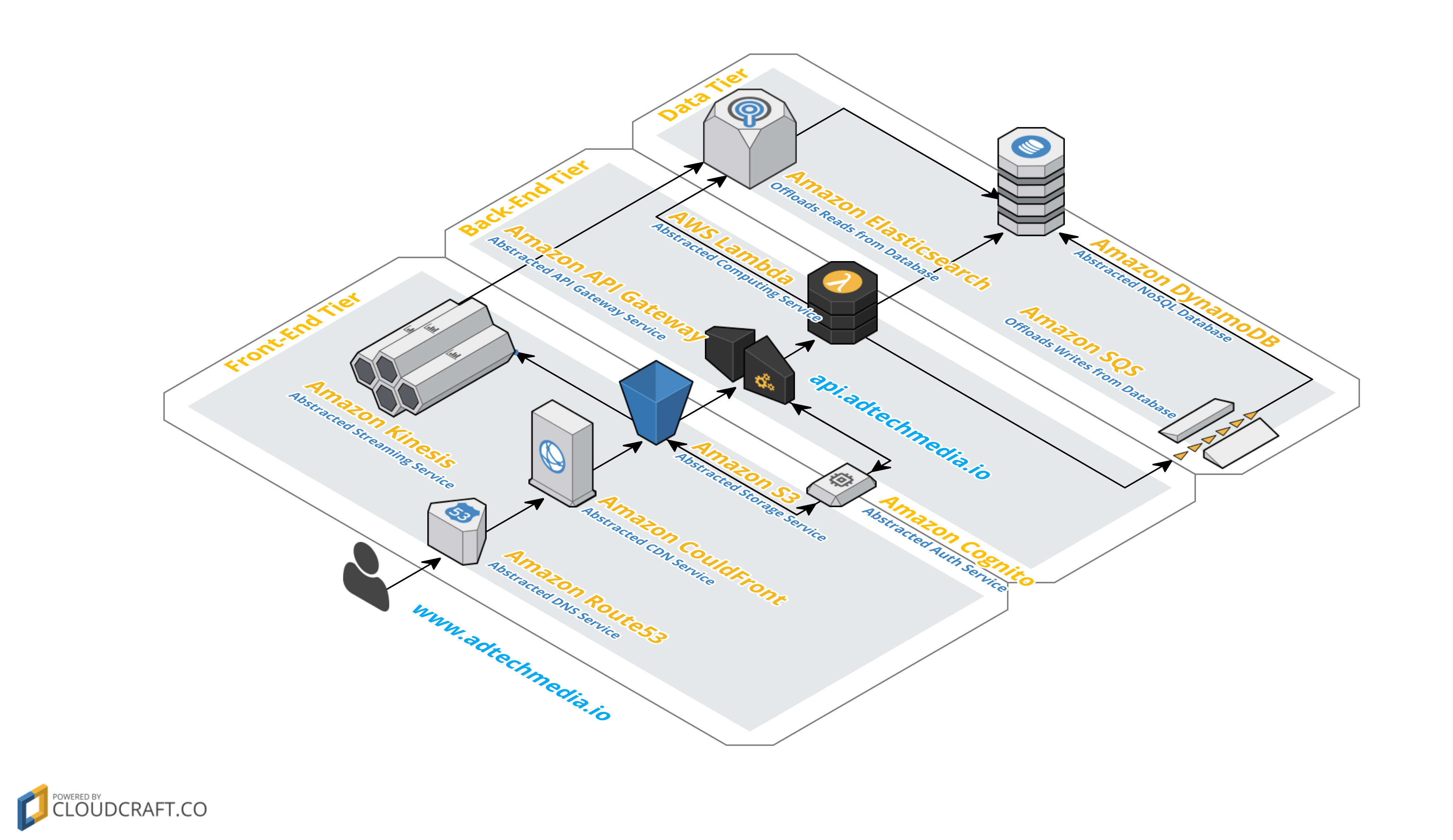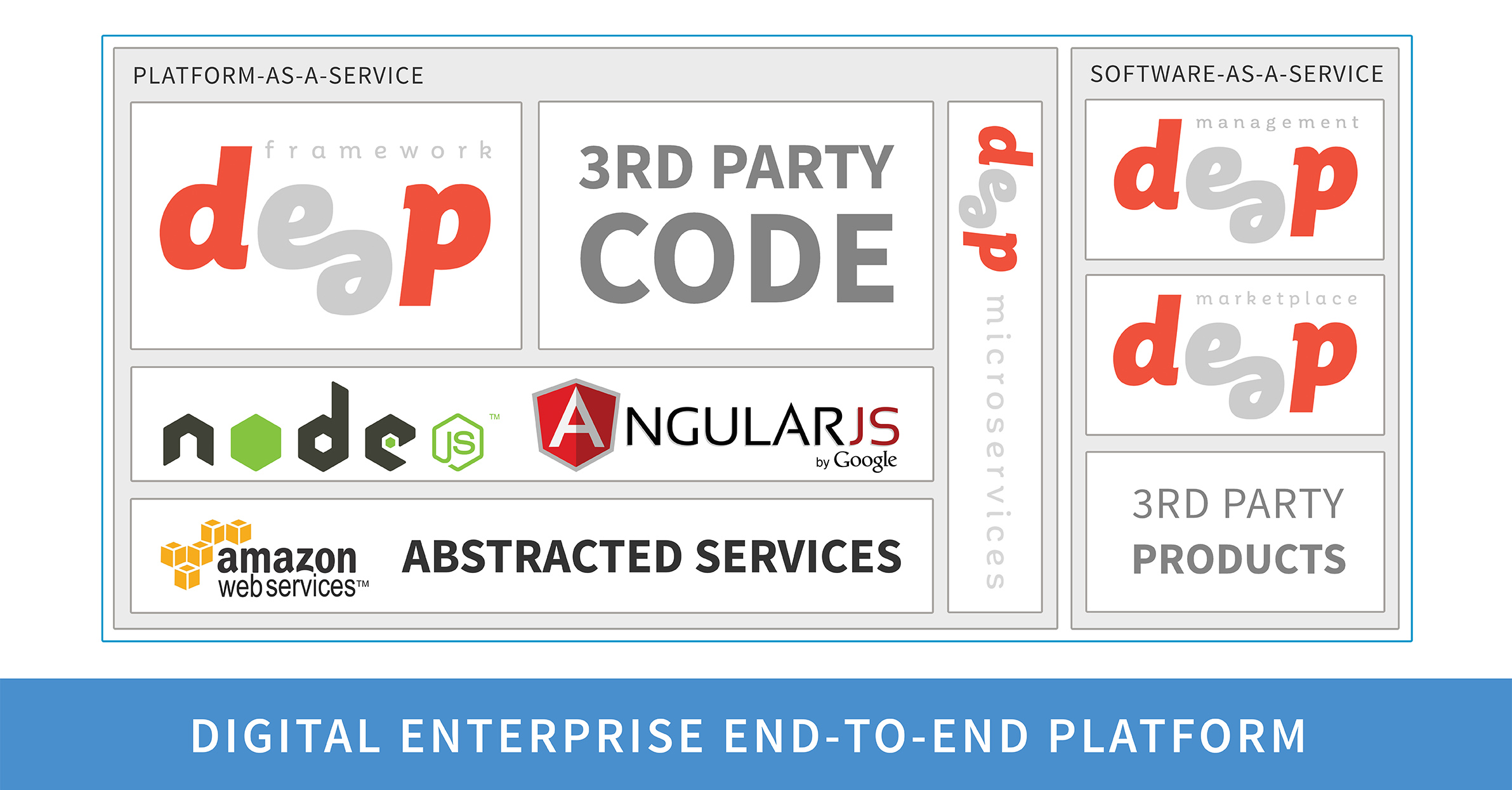
Security News
Research
Data Theft Repackaged: A Case Study in Malicious Wrapper Packages on npm
The Socket Research Team breaks down a malicious wrapper package that uses obfuscation to harvest credentials and exfiltrate sensitive data.
deep-kernel
Advanced tools
Digital Enterprise End-to-end Platform, also known as DEEP, is low cost and low maintenance
Platform-as-a-Service powered by abstracted web services
from cloud providers like Amazon Web Services. This approach has been labeled as
Serverless Architecture.
DEEP Framework is a core component
of the Platform-as-a-Service that abstracts web services from specific cloud providers. At this moment
only Amazon Web Services is supported. Developers are encouraged to add support for
Microsoft Azure, Google Cloud Platform, and so on.

DEEP Framework is a nodejs package that is published on npmjs: https://www.npmjs.com/package/deep-framework.
If you are new to node and npm, check out this tutorial to learn more.
DEEP Framework is a nodejs package. In fact it's a collection of nodejs packages, also known as
DEEP Abstracted Libraries. Here below is the complete list:
| DEEP Abstracted Library | Description and Documentation | Abstracted Web Service(s) |
|---|---|---|
| deep-asset | Assets Management Library | Amazon S3 |
| deep-cache | Cache Management Library | Amazon ElastiCache |
| deep-core | Core Management Library | - |
| deep-db | Database Management Library | Amazon DynamoDB, Amazon SQS |
| deep-di | Dependency Injection Management Library | - |
| deep-event | Events Management Library | Amazon Kinesis |
| deep-fs | File System Management Library | Amazon S3 |
| deep-kernel | Kernel Management Library | - |
| deep-log | Logs Management Library | Amazon CloudWatch Logs |
| deep-notification | Notifications Management Library | Amazon SNS |
| deep-resource | Resouces Management Library | AWS Lambda, Amazon API Gateway |
| deep-security | Security Management Library | AWS IAM, Amazon Cognito |
| deep-validation | Validation Management Library | - |

If DEEP Framework is intended to be used globally, just run in command line:
npm install deep-framework -g
Alternatively, if used as dependency, include it in package.json file. For example:
{
"name": "say-hello-world",
"version": "0.0.1",
"description": "AWS Lambda that says hello to the world",
"dependencies": {
"deep-framework": "1.0.*",
...
},
...
}

There are couple of web apps that are using DEEP Framework at their core:
DEEP Microservices Hello World (https://github.com/MitocGroup/deep-microservices-helloworld) is a web app that show cases a full stack example of using DEEP Microservices in the context of Platform-as-a-Service. Developers can either fork this repository or
npm install deepify -g(https://www.npmjs.com/package/deepify) and run in the command linedeepify helloworld ~/deep-hello-world.
DEEP Microservices Todo App (https://github.com/MitocGroup/deep-microservices-todo-app) is a web app inspired from AngularJS TodoMVC Example (https://github.com/tastejs/todomvc/tree/master/examples/angularjs). It reuses AngularJS module and integrates using
DEEP Frameworkto streamline development and deployment using cloud-based web services.
DEEP Marketplace (https://www.deep.mg) is Software-as-a-Service, built on top of DEEP, that empowers customers to choose functionality from listed microservices and deploy them together as an web app into their own AWS accounts with just few clicks; as well as empowers developers to create and publish their microservices and monetize them in similar approach to Apple's App Store.

Travis CI is a continuous integration service used to build and testprojects hosted on GitHub. Travis CI is configured by adding a file named .travis.yml, which is a YAML format text file, to the root directory of the GitHub repository.
Codacy offers an automated code review tool for developers that continuously monitors code for problematic patterns, with the aim being to reduce the amount of time spent poring over code style.
Coveralls provides constant updates on your project's automated test coverage. It is now available for open source projectsto start tracking code coverage on project.
ESDoc is a documentation generator for JavaScript(ES6). It produces a practical documentation, measures the coverage, integrates the test code and more.

We are eager to get your feedback, so please use whatever communication channel you prefer:
This project is open source, and we encourage developers to contribute. Here below is the easiest way to do so:
Make sure you update package.json (or deepkg.json, depends on the use case) and put your name and contact information in contributors section. We would like to recognize the work and empower every contributor in creative ways :)
Changelog files are located in /changelog folder.
See CHANGELOG.md for latest changelog.
This repository can be used under the MIT license.
See LICENSE for more details.
This repository is being sponsored by:


FAQs
DEEP Kernel Library
The npm package deep-kernel receives a total of 1 weekly downloads. As such, deep-kernel popularity was classified as not popular.
We found that deep-kernel demonstrated a not healthy version release cadence and project activity because the last version was released a year ago. It has 1 open source maintainer collaborating on the project.
Did you know?

Socket for GitHub automatically highlights issues in each pull request and monitors the health of all your open source dependencies. Discover the contents of your packages and block harmful activity before you install or update your dependencies.

Security News
Research
The Socket Research Team breaks down a malicious wrapper package that uses obfuscation to harvest credentials and exfiltrate sensitive data.

Research
Security News
Attackers used a malicious npm package typosquatting a popular ESLint plugin to steal sensitive data, execute commands, and exploit developer systems.

Security News
The Ultralytics' PyPI Package was compromised four times in one weekend through GitHub Actions cache poisoning and failure to rotate previously compromised API tokens.